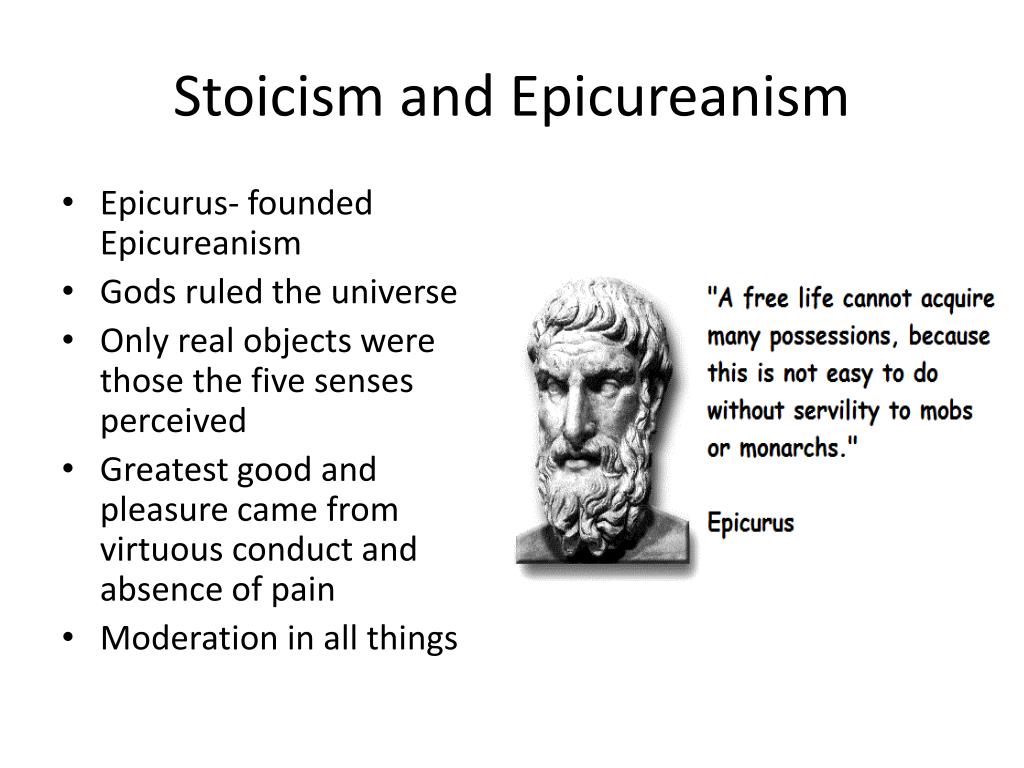Title: Epicureanism and Stoicism: A Roadmap to a Life of Comfort and Satisfaction
Introduction:
In the pursuit of a fulfilled and contented life, humanity has embarked on an everlasting quest to uncover philosophies that can guide us toward lasting comfort and satisfaction. Among the countless schools of thought, two prominent philosophies – Epicureanism and Stoicism – have stood the test of time, offering distinct perspectives on how to navigate the complex tapestry of existence.
Epicureanism, founded by the Greek philosopher Epicurus in the 4th century BC, emphasizes the pursuit of pleasure as the ultimate goal of life. However, this pursuit is not to be confused with hedonism or irrational indulgence. Instead, Epicureanism advocates for the attainment of tranquility and the avoidance of unnecessary suffering, achieved through thoughtful contemplation, moderation, and the cultivation of harmonious relationships.
On the other hand, the philosophy of Stoicism emerged in ancient Greece and reached its zenith during the Roman Empire. Developed by philosophers such as Zeno of Citium and Seneca, Stoicism focuses on the cultivation of virtue, self-discipline, and resilience in the face of adversity. It encourages individuals to accept the natural order of the world, detachment from material possessions, and the understanding that true contentment lies in our internal state of mind, rather than external circumstances.
While Epicureanism and Stoicism may appear to diverge in their approaches, both philosophies share common ground in their pursuit of a life filled with comfort and satisfaction. Both advocate for the importance of self-reflection, temperance, and the development of personal virtues. Moreover, they both highlight the significance of embracing the present moment and navigating life’s challenges with wisdom and resilience.
Join us as we delve into the realms of Epicureanism and Stoicism, exploring their key principles, practices, and practical applications. We will examine how these ancient philosophies can serve as invaluable roadmaps, guiding us toward a life of comfort, fulfillment, and lasting inner peace. By incorporating their profound insights into our daily lives, we unlock the potential for true contentment and discover the path to a purposeful existence.
1. Understanding Epicureanism: Seeking Comfort and Satisfaction in Everyday Life
- Epicureanism, a philosophical school founded by Epicurus, emphasizes the pursuit of pleasure and the avoidance of pain as the ultimate goal in life.
- This pleasure is not defined by material indulgences, but rather by the absence of physical and mental suffering.
- Epicureans believe that true happiness lies in finding comfort and satisfaction in simple pleasures, such as friendship, knowledge, and a tranquil state of mind.
- By cultivating moderation and practicing mindfulness, individuals can navigate the complexities of life and attain a sense of fulfillment in their day-to-day experiences.
2. Stoicism: Embracing Inner Serenity and Contentment for a Fulfilling Life
- Stoicism, originating from the teachings of Zeno of Citium, focuses on the development of inner tranquility and contentment in order to lead a fulfilling life.
- Stoics believe that external circumstances are beyond our control, but we have complete mastery over our own thoughts and reactions.
- By practicing self-discipline, acceptance of the present moment, and detachment from external outcomes, individuals can overcome adversity and cultivate resilience in the face of challenges.
- Stoicism encourages individuals to focus on the things they can control, rather than being consumed by external circumstances, and to find true fulfillment through self-improvement and aligning their actions with virtuous principles.
3. The Epicurean Path: Navigating Towards a Life of Pleasure and Wholeness
- The Epicurean philosophy offers a path to a life of pleasure and wholeness through a deliberate pursuit of what truly brings joy and satisfaction.
- Epicureans reject excessive desires and superficial pleasures, instead advocating for a balanced approach to life.
- By fostering deep connections in relationships, engaging in intellectual pursuits, and savoring the simple pleasures of everyday life, individuals can enhance their overall well-being and achieve a sense of contentment.
- The Epicurean path emphasizes the importance of self-reflection and intentional choices, ultimately leading to a life of fulfillment and happiness.
4. Stoicism: Building Resilience and Finding Tranquility in the Journey of Life
- Stoicism, a philosophical school embraced by many ancient Greek and Roman thinkers, offers a practical approach to building resilience and finding tranquility amidst the challenges and uncertainties of life.
- Stoic teachings encourage individuals to detach themselves from external circumstances and focus on developing inner strength and fortitude.
- By accepting the impermanence of life and practicing mindfulness, individuals can cultivate a sense of serenity even in the midst of turmoil.
- Stoicism teaches that adversity is an opportunity for growth and personal development, and by facing challenges with courage and wisdom, individuals can build resilience and find lasting tranquility in their journey.
5. Epicureanism and Stoicism: Embracing Philosophies of Contentment and Joy for a Meaningful Existence
- Both Epicureanism and Stoicism offer profound insights into finding contentment, joy, and meaning in life.
- While Epicureanism emphasizes seeking pleasure and avoiding pain through moderation and simplicity, Stoicism focuses on inner strength and acceptance of the present moment.
- However, both philosophies converge on mindful living, cultivating virtue, and appreciating the beauty of simple experiences.
- By embracing these philosophies, individuals can create a meaningful existence, free from excessive desires, external pressures, and the fear of adversity.
Epicureanism
- Epicureanism was founded by the Greek philosopher Epicurus in the 4th century BC.
- It emphasizes the pursuit of pleasure as the ultimate goal of life, but not in a hedonistic sense. Epicurus argued that true pleasure comes from attaining peace of mind, tranquility, and freedom from pain and fear.
- The philosophy encourages individuals to avoid unnecessary desires and to focus on simple pleasures and natural comforts.
- Epicureanism promotes a minimalist lifestyle and promotes the practice of prudence in realizing what truly brings pleasure and what is merely superficial.
Stoicism
- Stoicism was founded by the Greek philosopher Zeno of Citium in the 3rd century BC.
- It puts emphasis on living a life in accordance with nature, accepting what cannot be changed, and developing inner strength and resilience.
- Stoicism teaches that true happiness comes from living in harmony with the divine will, or the natural order of the universe.
- The philosophy encourages individuals to focus on what they can control (such as their thoughts and actions) and to detach themselves from external outcomes beyond their control.
- Stoicism teaches the practice of virtues such as wisdom, courage, justice, and self-discipline, which leads to a state of tranquility and eudaimonia (flourishing).
Combining both philosophies, one can find a balance between seeking simplicity and pleasure while also developing inner strength and resilience. Both Epicureanism and Stoicism offer valuable insights on how to live a comfortable and satisfactory life, albeit from different perspectives.

The Value of Epicureanism and Stoicism in Navigating Life
In conclusion, the philosophical concepts of Epicureanism and Stoicism offer valuable insights and guidance in navigating the complexities of life in search of comfort and satisfaction. While both schools of thought differ in their approaches, they share a common goal of achieving tranquility and contentment.
Epicureanism: Finding Pleasure in Meaningful Experiences
Epicureanism emphasizes the pursuit of pleasure, but not in a hedonistic or self-indulgent manner. Instead, it advocates for pleasure derived from simple and meaningful experiences, cultivating friendships, and minimizing unnecessary desires. This mindset encourages individuals to live in the present and appreciate the small joys in life, ultimately leading to a more fulfilling and satisfying existence.
Stoicism: Developing Inner Strength and Resilience
On the other hand, Stoicism focuses on developing resilience and inner strength by accepting what is outside of our control and directing our energy towards what we can influence. By practicing self-discipline, cultivating virtue, and embracing the impermanence of life, Stoicism provides a roadmap for finding inner peace and equanimity even in the face of adversity.
The Complementary Nature of Epicureanism and Stoicism
While Epicureanism and Stoicism may seem contrasting at first, they can be seen as complementary philosophies. The pursuit of pleasure and comfort advocated by Epicureanism is enhanced by the Stoic principles of detachment and acceptance. Similarly, the Stoic emphasis on self-mastery and resilience is complemented by the Epicurean emphasis on finding joy and contentment in the present moment.
Incorporating Both Philosophies for a Fulfilling Life
Ultimately, incorporating aspects of both Epicureanism and Stoicism into our lives can serve as a valuable roadmap towards a life of comfort and satisfaction. By seeking pleasure in moderation, cultivating resilience, and recognizing the inherent impermanence of life, individuals can navigate the complexities of modern existence with grace and fulfillment.
